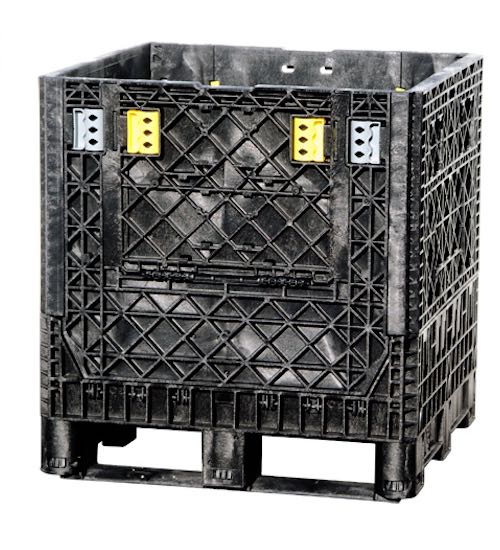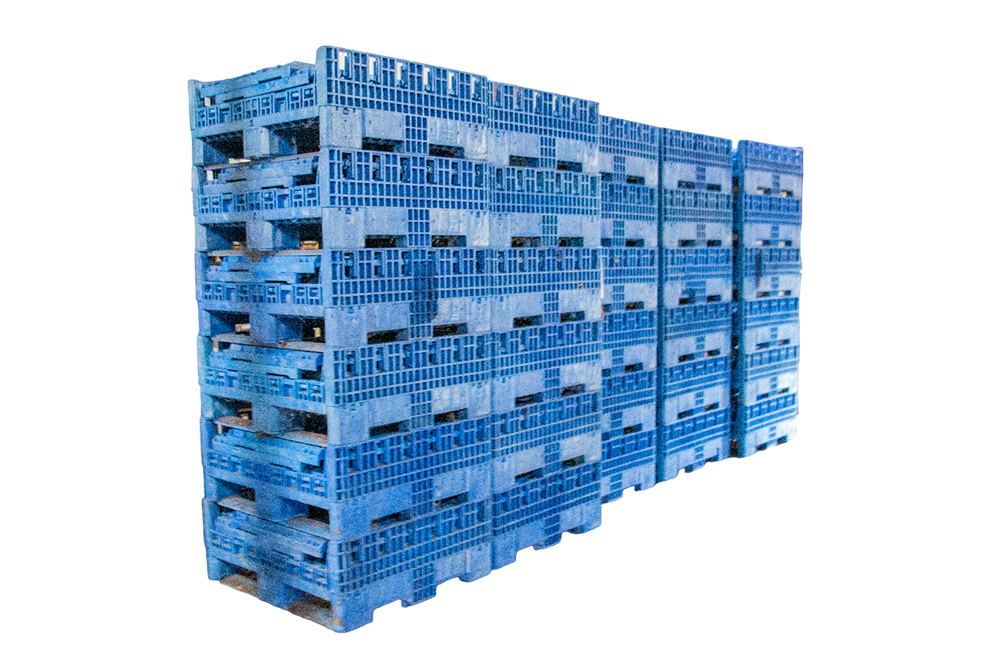Why used bulk containers are efficient for large-scale material management
Wiki Article
Why Mass Containers Are Essential for Sustainable and Economical Transport
Mass containers play a vital role in modern-day logistics. They help with the reliable motion of huge quantities of goods, thus enhancing transportation procedures. This technique not just reduces expenses however additionally minimizes environmental impact through reduced emissions and waste generation. As industries look for even more sustainable practices, the adoption of bulk containers is coming to be progressively substantial. What implications does this shift hold for future logistics and supply chain monitoring?
The Benefits of Using Bulk Containers in Logistics
Mass containers change logistics by improving effectiveness and sustainability. These containers allow for the transportation of huge quantities of products in a solitary trip, considerably decreasing the variety of trips required. This not just improves operations but additionally decreases labor costs related to handling, packing, and dumping. Additionally, mass containers are developed to enhance area utilization within transportation cars, ensuring that even more products can be shipped all at once.The standardization of bulk containers likewise simplifies the logistics process. With uniform dimensions, they can be easily piled and stored, resulting in boosted stockroom management. Bulk containers commonly include durable products that safeguard materials from damage during transportation, therefore decreasing item loss and increasing general integrity. As a result, services can experience enhanced supply chain performance, inevitably resulting in increased success and consumer contentment. This mix of variables makes bulk containers a crucial possession in modern-day logistics.
Environmental Influence: Reducing Waste and Carbon Impact
As industries progressively prioritize sustainability, the adoption of bulk containers has arised as a key technique for minimizing waste and lowering carbon footprints. These containers minimize making use of packaging products, such as boxes and plastic, thereby significantly decreasing general waste generation. By combining deliveries, bulk containers improve transportation efficiency, permitting even more products to be transported per journey. This reduction in trips directly associates with lower greenhouse gas exhausts, adding to a smaller carbon footprint.Furthermore, bulk containers can usually be recycled or recycled, additionally minimizing environmental influence. The resilience of these containers warranties they can endure multiple transport cycles, decreasing the need for single-use choices. used collapsible containers. By simplifying logistics and advertising efficient resource usage, mass containers not just support sustainable techniques but likewise urge industries to straighten with global environmental objectives. Eventually, their application shows a commitment to environmental stewardship and liable source management
Price Cost Savings: Just How Mass Containers Lower Transport Costs
While several business seek means to improve their bottom line, using bulk containers offers a substantial opportunity for decreasing transport expenditures. Bulk containers maximize the volume of items transported, enabling businesses to ship larger quantities simultaneously. This effectiveness reduces the variety of journeys needed, straight reducing gas expenses and reducing labor costs connected with loading and discharging.In addition, bulk containers often feature structured layouts that optimize space utilization within transport lorries. This means less empty rooms, causing extra reliable use readily available capacity. The longevity of bulk containers can decrease the threat of item damage throughout transportation, making sure and decreasing losses that more items show up intact.
Enhancing Supply Chain Effectiveness With Bulk Storage Space Solutions
Mass storage space options play an essential duty in boosting supply chain efficiency by maximizing supply administration. By consolidating goods right into less, bigger containers, organizations can considerably decrease dealing with expenses related to regular transfers and processing. This streamlined technique permits much better monitoring and administration of stock, eventually leading to boosted functional efficiency.Structured Inventory Administration
Effective supply administration is necessary for optimizing supply chain procedures, especially when companies adopt bulk storage services. These options make it possible for businesses to maintain greater stock levels while decreasing the frequency of replenishment. By settling products into bulk containers, companies can enhance their inventory processes, decreasing the complexity related to tracking multiple smaller sized plans. This method helps with exact inventory counts and enhances forecasting accuracy, permitting more enlightened decision-making. On top of that, bulk storage space solutions simplify warehouse organization, making it easier to find and access products when needed. Because of this, organizations can accomplish a much more reliable stock turn over price, inevitably boosting overall supply chain efficiency and decreasing the chance of stockouts or overstock scenarios.
Reduced Handling Expenses
The implementation of bulk storage space services not just streamlines stock management however likewise substantially minimizes taking care of prices throughout the supply chain. By consolidating products into mass containers, business minimize the demand for regular handling and transfer in between various storage and transport systems. This technique reduces labor prices connected with loading, unloading, and relocating smaller sized bundles. In addition, mass storage reduces the regularity of deliveries, leading to lower transport costs and decreased fuel usage. As an outcome, organizations can enhance their logistics procedures, enabling for an extra efficient allowance of resources. Eventually, reduced dealing with costs add to enhanced general supply chain performance, cultivating an atmosphere that sustains both sustainability and financial stability.
Flexibility of Bulk Containers Throughout Various Industries
Several sectors have unique requirements for transport and storage, bulk containers have arised as a versatile solution that fulfills a vast variety of requirements. These containers, ranging from big bins to specialized storage tanks, can fit varied products, consisting of fluids, powders, and granules. In the agricultural field, bulk containers help with the transport of fertilizers and grains, while the food and beverage market utilizes them for components and finished items. The chemical sector counts on mass containers for securely delivering harmful products, ensuring conformity with security policies. Additionally, construction firms take advantage of bulk containers for carrying aggregates and various other materials. Their versatility encompasses different modes of transportation, consisting of ships, vehicles, and trains, enhancing logistical effectiveness. This convenience not only streamlines operations throughout different fields but additionally promotes sustainability by decreasing packaging waste and enhancing space in transportation. For that reason, bulk containers play a vital duty in modern-day supply chain management.Future Fads wholesale Container Usage and Sustainability
The future of mass container use is significantly formed by cutting-edge materials development that boosts sustainability. In addition, automation in logistics assures to streamline operations, lowering waste and boosting performance. Accepting circular economic situation techniques will certainly additionally reinvent just how bulk containers are created, made use of, and recycled, cultivating a more lasting transport landscape.Innovative Materials Growth
As industries progressively focus on sustainability, cutting-edge materials advancement wholesale containers becomes a considerable variable in boosting environment-friendly transportation services. Researchers and suppliers are checking out eco-friendly plastics, recycled compounds, and light-weight metals to decrease environmental effect. These products not just reduce waste but also enhance fuel performance by decreasing the general weight of containers. Furthermore, improvements in smart products, which can adjust to varying conditions, enhance the durability and capability of mass containers. The integration of these cutting-edge materials lines up with circular economic climate principles, promoting reuse and recycling. As the demand for sustainable techniques grows, the growth of such products will certainly play an important function fit the future of bulk container usage in logistics and transport.Automation in Logistics
Considerable innovations in automation are positioned to transform logistics and the usage of mass containers, boosting sustainability in transport. Automated systems, including drones and independent lorries, are streamlining the motion of mass containers, decreasing the dependence on conventional fuel-powered transportation. These technologies maximize routing and loading processes, reducing empty miles and enhancing gas performance. Furthermore, automated stock management systems enhance tracking and surveillance of mass containers, making certain better resource allotment and reduced waste. The assimilation of the Web of Things (IoT) allows real-time data evaluation, enabling aggressive decision-making that lines up with sustainability objectives. As automation proceeds to evolve, it is anticipated to drive better advancements wholesale container use, eventually supporting even more lasting logistics practices and reducing the environmental impact of transport.Round Economy Practices
Innovations in automation are setting the stage for a more incorporated approach to circular economy practices in the domain of bulk container use. As industries significantly welcome sustainability, bulk containers are being developed for durability and reusability. This shift not just reduces waste but likewise boosts resource efficiency. Business are taking on methods such as closed-loop systems, where used containers are gathered, refurbished, and reestablished into the supply chain. Furthermore, wise innovations track container life process, facilitating much better administration and lowering environmental effect. The collaboration in between makers, logistics suppliers, and end-users is necessary in establishing criteria for lasting container usage. refurbished bulk containers. Future fads indicate an expanding emphasis on products that are eco-friendly and recyclable, additional enhancing the round economic situation's principles in bulk transportation
Frequently Asked Concerns
What Materials Are Mass Containers Generally Made From?
Bulk containers are normally constructed from sturdy materials such as high-density polyethylene, light weight aluminum, cardboard, and steel. These materials offer strength, flexibility, and security, making them ideal for carrying various items in different used bulk containers industries efficiently.Just how Do I Select the Right Dimension Bulk Container?
Choosing the right dimension bulk container includes reviewing the volume of products to be transferred, taking into consideration managing equipment compatibility, and evaluating storage area demands. Correct size guarantees efficiency in transportation and minimizes waste throughout delivery.Are Mass Containers Reusable or Recyclable?
Bulk containers are frequently multiple-use, created for several journeys, boosting sustainability. Lots of can likewise be reused, relying on the materials made use of. Selecting recyclable choices even more supports ecological goals and decreases waste in transport methods.What Security Rules Relate To Bulk Container Transport?
Safety and security regulations for bulk container transportation consist of conformity with the Department of Transportation standards, proper labeling of hazardous products, architectural honesty evaluations, and adherence to weight limitations to assure safe handling and stop accidents throughout transportation.Exactly How Can Organizations Change to Utilizing Mass Containers Properly?
Services can change to bulk containers by reviewing present logistics, educating team on handling, investing in appropriate equipment, optimizing stock management, and teaming up with suppliers to assure compatibility and efficiency throughout the supply chain.
As industries increasingly prioritize sustainability, the fostering of bulk containers has actually arised as an essential approach for decreasing waste and decreasing carbon impacts. By settling materials into bulk containers, business can enhance their supply procedures, lowering the complexity linked with tracking several smaller packages. As industries increasingly prioritize sustainability, cutting-edge products development in bulk containers arises as a considerable element in boosting environmentally friendly transportation remedies. Automated systems, consisting of drones and autonomous automobiles, are enhancing the movement of bulk containers, minimizing the reliance on conventional fuel-powered transport. Furthermore, automated stock administration systems boost monitoring and monitoring of bulk containers, making certain better resource allotment and minimized waste.
Report this wiki page